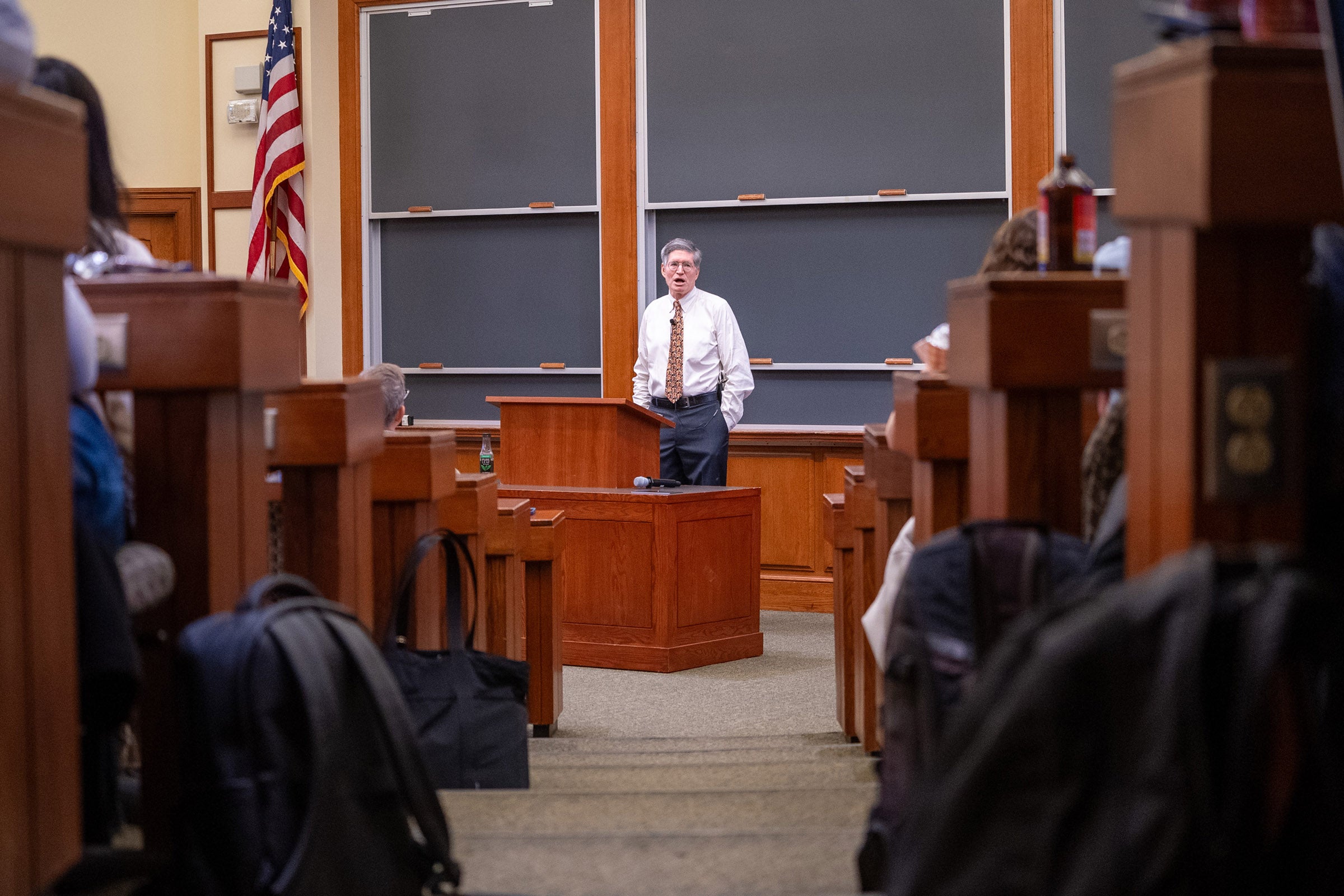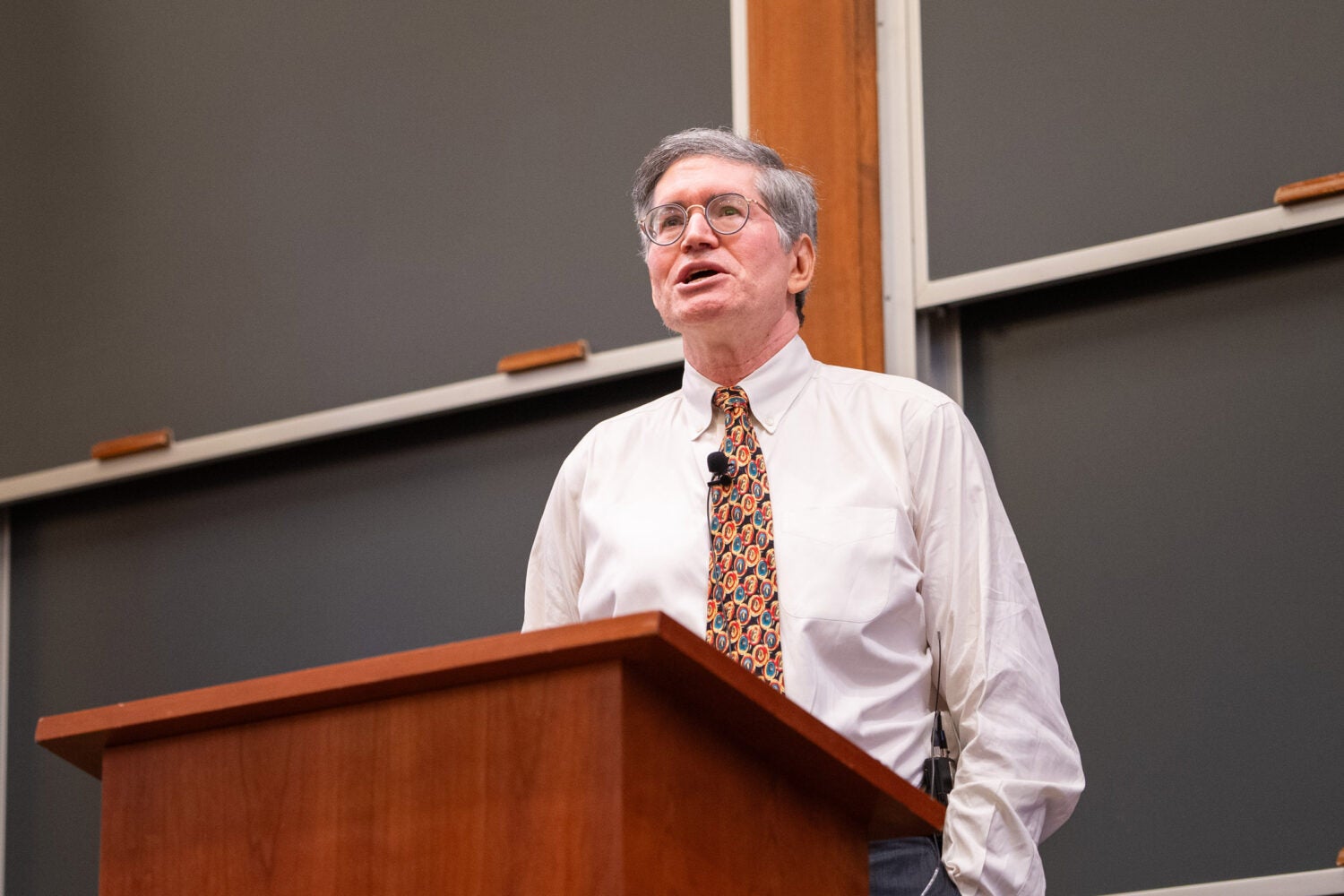“The next four years are going to be like hell,” Professor Michael Klarman warned Harvard Law School’s graduating class in his Last Lecture last week. During a time when he said that American democracy may be at risk, Klarman stressed the need to be engaged rather than discouraged.
“Everybody needs to do their part,” he told students during his April 14 remarks. “You have special skills to resist. You have relatively privileged positions, and you have knowledge and insight into what is going on in the world. ‘With knowledge and insight comes special responsibilities,’ to quote Spider-Man.”
He praised students who have already dedicated themselves to pro-democracy lawyering, and urged the others to adopt it as a sideline. “The time that we took American democracy for granted, I think, is over. We need to get to work.”
Klarman, the Charles Warren Professor of Legal History, was one of four professors chosen by class marshals to impart final lessons during a series of Last Lectures to Harvard Law’s graduating Class of 2025. While he warned that his talk would contain strong criticism of the current U.S. administration, he also focused on constructive solutions.

“I could easily go on for an hour or more just listing the autocratic maneuvers of the current administration,” he said at the outset. But he chose to focus on “close to home” issues, notably the Trump administration’s recent challenges to the legal profession and to higher education.
“Nobody has even tried to make a case that this is anything other than personal retribution by the president against what he sees as his political enemies.”
He cited president’s attacks on law firms that have worked against his interests — including Perkins Coie, which was the focus of an executive order last month. “This is as obvious a First Amendment violation as you can possibly imagine … My understanding is that Perkins Coie is destroyed, even though they won in court. Because if your clients are risk-averse, they’re not going to stick with you to find out what the administration has in mind.”
He also mentioned the current administration’s attacks on leading Democratic voting rights attorney Marc Elias. “They’re trying to intimidate him. I’m sure it would be hard to count the number of death threats he receives now. The purpose again is to deter lawsuits against the administration … This is actually a lot like what Southern states did to the NAACP in the 1960s, [when it was] the only organization that legitimately could bring lawsuits pursuing school desegregation.”
He criticized what he called the hypocrisy of the Trump administration using allegations of anti-Semitism as a pretext to withhold funding from universities. “I make no claim on whether there are legitimate claims of anti-Semitism against these universities,” he said, mentioning Columbia and Cornell. “But I will make a claim, quite insistently and confidently, that this administration does not care about anti-Semitism.” He cited disparaging quotes from Trump’s autobiography and speeches as evidence. The real objective, he said, is to control universities, since “[t]hat’s part of the autocratic playbook everywhere.”
‘Politics is not a spectator sport’
Pondering solutions, Klarman admitted that “I don’t have a lot to say here, but I have a few things to say about why you hopefully will remain optimistic and hopeful.”
First, he said, remember that politics is not a spectator sport. “I understand the temptation to tune things out and just live your life. It is bad for your mental health to fixate on this stuff … [but] if you tune out entirely, the autocrats win. That’s part of the strategy. … You need to do something. You don’t need to do everything.”
Klarman advised graduating law students to keep voting and to make sure their friends do too, and not to “over-catastrophize” the current situation. “Of course there will be elections in 2026 and 2028. It is no longer the authoritarian playbook to cancel elections. You can’t get away with that, certainly not in the United States where we have 250 years of democracy.”
Although he said he is “not a demonstrator by nature,” he stressed the importance of making one’s voice heard, as in recent anti-administration demonstrations. “These [rallies] are empowering, they’re joyful, they inspire opposition politicians to take a stand. I’m pretty sure one reason why Democrats in Congress are speaking up more is that they see their constituents demanding that there be some leadership. Act locally.”
But he also reminded his audience that they will need to decide how much risk they’re willing to take for their principles. “Are you willing to risk your job? Are you willing to get posted on social media and have people harass you? Are you willing to tell a law firm that you won’t interview with them until they grow a spine?”
Lessons from the past
As a historian, Klarman cited previous eras when the national outlook seemed dire, including the founding of the Abolitionist movement in Boston — when leader William Lloyd Garrison was so vilified that he was dragged around the city in a mock lynching. Klarman also highlighted the against-long-odds struggles of eventual Supreme Court Associate Justices Thurgood Marshall and Ruth Bader Ginsburg in their support of civil rights for African Americans and women.
“It’s possible to make enormous social change,” he said. “It sometimes takes decades. Restoring democracy will have to be seen as a similar enterprise.”
Nobody, he said, is being asked to risk their lives the way Marshall and Russian dissident Alexei Navalny did. But he said today’s world has its own heroes, including homeless advocates and immigration lawyers — and he urged the soon-to-be Harvard Law alumni to join those ranks.
These “terrifying times” can be a blessing as well as a curse, he said. “Serving a cause larger than yourself is ennobling, it’s invigorating and it’s ultimately supremely satisfying … I know for a fact that Ruth Bader Ginsburg and Thurgood Marshall would have told you that.”

View full coverage from the festivities of the 2025 Class Day and Commencement Ceremonies at Harvard Law School
Want to stay up to date with Harvard Law Today? Sign up for our weekly newsletter.
